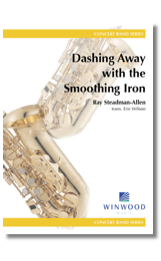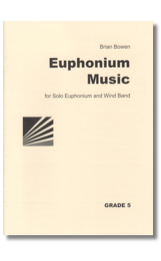Results
-
£29.95
Shenandoah - Score and Parts - Leonard Ballantine
Program NotesCanadian Salvation Army officer Leonard Ballantine is a gifted and talented musician with a wonderful talent for composing and arranging for both instrumental and vocal ensembles.Among the many compositions he has written is this beautiful arrangement of the American folk song Shenandoah. It was originally conceived as a brass band arrangement and published in 1998. It has also appeared as a vocal setting, but has now been faithfully transcribed for wind band by Brian Bowen and we are all sure that this will prove to be a popular addition to the repertoire.
Estimated dispatch 7-14 working days
-
£5.95
Shenandoah - Score only - Leonard Ballantine
Program NotesCanadian Salvation Army officer Leonard Ballantine is a gifted and talented musician with a wonderful talent for composing and arranging for both instrumental and vocal ensembles.Among the many compositions he has written is this beautiful arrangement of the American folk song Shenandoah. It was originally conceived as a brass band arrangement and published in 1998. It has also appeared as a vocal setting, but has now been faithfully transcribed for wind band by Brian Bowen and we are all sure that this will prove to be a popular addition to the repertoire.
Estimated dispatch 7-14 working days
-
£29.95
Southdown - Score and Parts - Ray Steadman-Allen
Program NotesRay Steadman-Allen is one of the most foremost composers of the Salvation Army. He has over 400 pieces published and has been a most inventive and creative composer since his first composition was published in 1945. Having officer parents meant Ray grew up in the Salvation Army. He himself became an officer in 1950 and subsequently held many positions within the SA culminating in 1967 when he was appointed as the Head of Music Editorial where he was responsible for selecting and editing all music to be published by the SA. His versatility means he can compose music for all occasions and for all instrumental combinations; from Championship section test pieces to a straight forward setting of a children's song.The march Southdown represents music of a simpler nature from this great composer and was composed originally for a music school in Bolney Court. Bolney Court, near Brighton, is close to the downs in the southern county of Sussex, hence the title. It follows the traditional form of a march and will be an attractive addition to the repertoire of most types of wind-band.
Estimated dispatch 7-14 working days
-
£5.95
Southdown - Score only - Ray Steadman-Allen
Program NotesRay Steadman-Allen is one of the most foremost composers of the Salvation Army. He has over 400 pieces published and has been a most inventive and creative composer since his first composition was published in 1945. Having officer parents meant Ray grew up in the Salvation Army. He himself became an officer in 1950 and subsequently held many positions within the SA culminating in 1967 when he was appointed as the Head of Music Editorial where he was responsible for selecting and editing all music to be published by the SA. His versatility means he can compose music for all occasions and for all instrumental combinations; from Championship section test pieces to a straight forward setting of a children's song.The march Southdown represents music of a simpler nature from this great composer and was composed originally for a music school in Bolney Court. Bolney Court, near Brighton, is close to the downs in the southern county of Sussex, hence the title. It follows the traditional form of a march and will be an attractive addition to the repertoire of most types of wind-band.
Estimated dispatch 7-14 working days
-
£54.95
Swingtime Religion - Score and Parts - Barrie Gott
Program NotesBarrie Gott's big-band style festival arrangement Swingtime Religion is based on a popular religious song Give me that old time religion. It features an extended trumpet solo that in turn leads into a very simple presentation of featured melody. It's a fun item to play, and one that will also have a popular appeal with listeners!
Estimated dispatch 7-14 working days
-
£9.95
Swingtime Religion - Score only - Barrie Gott
Program NotesBarrie Gott's big-band style festival arrangement Swingtime Religion is based on a popular religious song Give me that old time religion. It features an extended trumpet solo that in turn leads into a very simple presentation of featured melody. It's a fun item to play, and one that will also have a popular appeal with listeners!
Estimated dispatch 7-14 working days
-
£79.95
The Call of the Righteous - Score and Parts - Leslie Condon
Program NotesCall of the Righteous is a tone poem that uses the Gospel song melody "When the Roll is Called Up Yonder" as its main theme. An unforgiving opening unison trumpet fanfare leads into the first statement of the tune, which then appears, either in its entirety or in fragments, throughout the piece alongside further thematic material derived from the opening fanfare theme. The reflective central section contains a beautiful original melody, introduced by the clarinet and developed elsewhere, before the music reverts to ideas derived from the opening section, introduced by a recapitulation of the opening fanfare figure, which is further developed to bring the music to a thrilling and dramatic conclusion.Although the music has its creative roots in religious doctrine, it has a lasting and popular appeal that makes it accessible and listenable at every level, with plenty to challenge on both technical and musical levels.
Estimated dispatch 7-14 working days
-
£15.95
The Call of the Righteous - Score only - Leslie Condon
Program NotesCall of the Righteous is a tone poem that uses the Gospel song melody "When the Roll is Called Up Yonder" as its main theme. An unforgiving opening unison trumpet fanfare leads into the first statement of the tune, which then appears, either in its entirety or in fragments, throughout the piece alongside further thematic material derived from the opening fanfare theme. The reflective central section contains a beautiful original melody, introduced by the clarinet and developed elsewhere, before the music reverts to ideas derived from the opening section, introduced by a recapitulation of the opening fanfare figure, which is further developed to bring the music to a thrilling and dramatic conclusion.Although the music has its creative roots in religious doctrine, it has a lasting and popular appeal that makes it accessible and listenable at every level, with plenty to challenge on both technical and musical levels.
Estimated dispatch 7-14 working days
-
 £78.00
£78.00Dashing away with the smoothing iron - Ray Steadman-Allen
The composer writes... A lighthearted arrangement of an old folk song. The style is generally bright with a short, slower change of pace in the middle. En route there are a couple of quotations which got into the music almost unbidden: a fragment of one of Mozart's horn concerti and 'A-hunting we will go'. '... a splendid concert piece for advanced tuba players.' WINDS Autumn 2008 Duration: c.3:00 Also available with piano or brass band.
Estimated dispatch 7-14 working days
-
 £90.00
£90.00Euphonium Music - Brian Bowen
Something of a classic in its brass band and piano versions! We are delighted, at last, to make this work available ith wind band accompaniment by the composer. Written in 1978, the work is constructed in three movements and is virtually a concerto for euphonium and band. The first movement begins with an unaccompanied motto theme, which uses all twelve notes of the scale but with a tonal feel. The slow second movement is based on an original song melody by the composer - 'The Eyes of God' - and affords lyrical and richly expressive playing that is typically euphonium. Movement three follows without a break - a capricious movement which ends triumphantly. Now available in versions for piano, brass band, wind band, and orchestra, Euphonium Music can be seen as a major contribution to the literature for the instrument. Duration: 15 minutes USA Grade 5 An orchestral version is available on hire.
Estimated dispatch 7-14 working days
